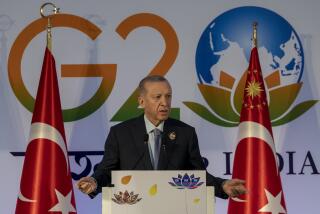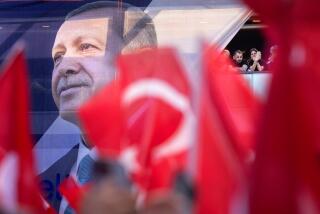Turkish leader begins goodwill visit to Greece
- Share via
Reporting from Athens — Turkish Prime Minister Recep Tayyip Erdogan swept into Greece on Friday with 10 Cabinet ministers and 80 businesspeople in tow, making a dramatic show of goodwill toward a historic rival.
Despite strong disagreements that continue to fester over Cyprus and the Aegean Sea, the longtime foes are hoping to hammer out mutual cuts in defense spending.
The savings would be particularly prized by Greece, where a severe financial crisis has provoked angry street demonstrations and forced painful cuts to retirement and other social benefits.
“Both countries have huge defense expenses, and they will achieve a lot of savings this way,” Erdogan told Greek state television. “I believe this visit will be the start of putting Greek-Turkish relations on a better foundation.”
The two countries have been wracked by sometimes bloody animosity for centuries, but both are now pushing to smooth relations. During this week’s visit, the two governments are expected to sign 21 agreements on issues such as migration, the environment and culture.
Still, signs of tensions crackled around the edges.
“We want to proceed to arms reduction under a basic political condition: that Turkey … respect international law on Aegean and west Mediterranean issues,” Greece’s Deputy Defense Minister Panos Beglitis told Greek radio.
Greece spends a larger percentage of its gross domestic product on defense than any other country in the European Union, and the arms purchases are almost solely motivated by hostilities with Turkey.
The European Union, which just voted for an unprecedented $140-billion rescue package for Greece, has pushed Athens to cut its defense spending.
Analysts in Athens are quick to point out that the country buys most of its weapons from Germany, France and Britain, as well as the United States.
Even at a time of difficult and controversial cutbacks, Athens has been wary of slashing military spending. Greece and Turkey have come to the brink of war repeatedly.
“Turkey has a lot of problems — Iraq, Iran — but we have only Turkey,” said George Glynos, an economy analyst with the Hellenic Foundation for European and Foreign Policy in Athens. “So if we can lower defense spending, it’s very important.”
Turkey, meanwhile, is enjoying relative prosperity and has been keen to flex greater diplomatic influence in the region. Under a “no problems with neighbors” foreign policy, Istanbul has taken tentative steps toward warming ties with other historical enemies, including the Kurds and Armenians.
Turkish businesses have invested heavily in Kurdish regions in Iraq, and Turkey recently opened the border with Syria. Meanwhile, Istanbul has sought to position itself as a mediator between the United States and Iran, as well as between Syria and Israel.
Turkey was badly stung by Europe’s wariness over its ambitions to join the European Union. Improving ties with Greece is a badly needed demonstration of its readiness to link up with the West.
More to Read
Sign up for Essential California
The most important California stories and recommendations in your inbox every morning.
You may occasionally receive promotional content from the Los Angeles Times.













